Quality Sleep: The Key to Enhancing Athletic Performance

People who love sports know that exercise plays an important role in health and happiness. However, in addition to training, sleep quality is also a key factor in improving athletic performance. Whether you are an average person or a professional athlete, understanding how to optimize sleep quality is crucial for enhancing both athletic performance and overall quality of life. Let’s take a closer look at how sleep quality can positively impact your athletic performance.
1. Recovery and Repair: For those who love sports, the body’s recovery and repair cannot be underestimated. Deep sleep is when the body releases growth hormones and promotes muscle and bone health. If you fail to get enough quality sleep after exercising, your body may not fully recover, impacting your athletic ability and next performance.
2. Focus and Reaction Speed: Sports often require high levels of focus and mental concentration. However, lack of sleep can affect your attention, reaction speed, and decision-making abilities. In activities that require quick decisions and intense focus, good sleep quality ensures that your brain stays sharp, which improves your athletic performance.
3. Muscle Coordination and Balance: Achieving excellent athletic skills requires muscle coordination and balance. Quality sleep helps maintain muscle coordination and improve athletic skills. Lack of sleep can lead to muscle fatigue, affecting your coordination and increasing the risk of injury.
4. Endurance and Strength: Whether it's endurance sports or strength training, sleep plays an important role. Good sleep helps maintain endurance and strength levels. Sleep deprivation can cause muscle fatigue, reduce endurance, and affect your performance during prolonged exercise.
5. Mental State: Exercise involves not only the body but also the mental state. Sleep is closely related to mental health. Lack of sleep can lead to emotional instability, anxiety, and increased stress, which can all negatively affect your athletic performance and training outcomes.
Most professional athletes and fitness experts agree that sleep is an indispensable part of any training program. In terms of dietary choices, some foods can help promote better sleep.
1. Reduce Caffeine Intake: Beverages like coffee, tea, and cola contain caffeine, a stimulant that can interfere with sleep. It is recommended to avoid these caffeinated drinks within four to six hours before bedtime.
2. Avoid Greasy Foods: Overeating greasy or fried foods can cause discomfort and digestive problems, affecting sleep quality. Choosing light and easily digestible foods at dinner time can help improve sleep.
3. Foods Rich in GABA, Tryptophan, and Jasmine Flowers: GABA (gamma-aminobutyric acid) and tryptophan are neurotransmitters that may help relax and promote sleep. Jasmine flowers are believed to have a calming effect. Foods rich in these nutrients include certain vegetables, nuts, and grains.
Everyone’s body condition and metabolic rate are different, so some foods may have varying effects on sleep for different people. If you have specific health conditions or needs, it is best to consult a healthcare professional or nutritionist to ensure your dietary choices benefit your body and sleep quality.